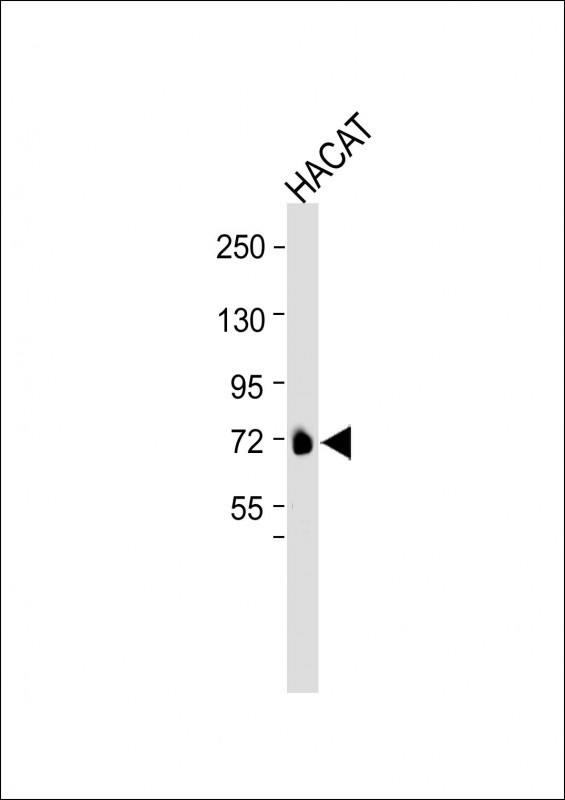
| WB | 咨询技术 | Human,Mouse,Rat |
| IF | 咨询技术 | Human,Mouse,Rat |
| IHC | 咨询技术 | Human,Mouse,Rat |
| ICC | 技术咨询 | Human,Mouse,Rat |
| FCM | 咨询技术 | Human,Mouse,Rat |
| Elisa | 咨询技术 | Human,Mouse,Rat |
| Aliases | Epithelial splicing regulatory protein 1, RNA-binding motif protein 35A, RNA-binding protein 35A, ESRP1, RBM35A |
| Entrez GeneID | 54845 |
| WB Predicted band size | 75.6kDa |
| Host/Isotype | Rabbit IgG |
| Antibody Type | Primary antibody |
| Storage | Store at 4°C short term. Aliquot and store at -20°C long term. Avoid freeze/thaw cycles. |
| Species Reactivity | Human, Mouse, Rat |
| Immunogen | This ESRP1 antibody is generated from rabbits immunized with a KLH conjugated synthetic peptide between 182-211 amino acids of human ESRP1. |
| Formulation | Purified antibody in PBS with 0.05% sodium azide. |
+ +
以下是关于ESRP1 (N-term)抗体的3篇参考文献,按文献名称、作者及摘要内容简要概括:
---
1. **文献名称**:*ESRP1 and ESRP2 are epithelial cell-type-specific regulators of FGFR2 splicing*
**作者**:Warzecha, C.C. et al.
**摘要**:该研究首次鉴定了ESRP1作为上皮细胞特异性RNA剪接调控因子,通过调控FGFR2等基因的可变剪接影响细胞迁移和分化。研究中开发了针对ESRP1 N端的抗体,用于免疫沉淀和免疫荧光实验,证实了ESRP1在上皮细胞中的定位及功能。
---
2. **文献名称**:*The splicing regulators Esrp1 and Esrp2 direct an epithelial splicing program essential for mammalian development*
**作者**:Bebee, T.W. et al.
**摘要**:本文通过基因敲除小鼠模型揭示了ESRP1/2在胚胎发育中的关键作用,并利用ESRP1 (N-term)抗体进行免疫组化分析,发现其在多种上皮组织(如肺、肠道)中高表达,调控细胞黏附相关基因的剪接程序。
---
3. **文献名称**:*Epithelial splicing regulator protein 1 (ESRP1) inhibits the epithelial-mesenchymal transition in pancreatic cancer*
**作者**:Dittmar, K. et al.
**摘要**:该研究探讨了ESRP1通过调控剪接事件抑制胰腺癌上皮-间质转化(EMT)的机制。使用ESRP1 N端抗体进行Western blot和免疫荧光实验,发现ESRP1表达缺失与肿瘤侵袭性增强相关,提示其作为癌症治疗靶点的潜力。
---
**备注**:上述文献均涉及ESRP1的功能研究,并明确使用其N端抗体进行实验验证(如蛋白定位、表达分析等)。如需具体实验细节,建议查阅原文方法学部分。
The ESRP1 (Epithelial Splicing Regulatory Protein 1) antibody targets the N-terminal region of the ESRP1 protein, a key RNA-binding protein involved in regulating alternative splicing of pre-mRNA. ESRP1 is primarily expressed in epithelial cells and plays a critical role in maintaining epithelial cell identity by controlling the splicing of transcripts encoding proteins related to cell adhesion, polarity, and motility. It promotes the inclusion of epithelial-specific exons in genes such as FGFR2. CD44. and ENAH, thereby influencing cell-cell interactions and cytoskeletal dynamics.
ESRP1 is closely associated with the epithelial-mesenchymal transition (EMT), a process critical in development and cancer metastasis. During EMT, ESRP1 expression is often downregulated, leading to a switch in splicing patterns that favor mesenchymal isoforms, enhancing cell migration and invasiveness. Studies have linked ESRP1 dysregulation to tumor progression, with its loss correlating with poor prognosis in carcinomas.
The ESRP1 (N-term) antibody is widely used in research to detect endogenous ESRP1 protein levels via techniques like Western blotting, immunofluorescence, and immunohistochemistry. Its specificity for the N-terminal region ensures recognition of full-length ESRP1. aiding investigations into its localization, expression dynamics, and functional roles in epithelial biology and disease. This antibody serves as a vital tool for exploring splicing regulation mechanisms and their implications in cancer and developmental disorders.
×